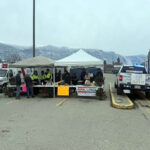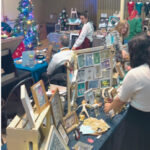Home »

A ‘strike supply’ is a sound idea
Homegrown
Water. The most powerful force on Earth. It is insidious in its determination, and utterly heartless in choosing its course.
And if you are in its way, may whatever deity you believe in help you. I personally refer to the Goddess in these instances.
With the recent devastation of the flooding in Alberta, and parts of B.C. affected to a lesser degree, we see not only the power nature wields, but how little power we, as humans, truly have.
My heart goes out to all those who have lost their homes, in Calgary, High River, the Sitsika Nation, in Exshaw and any other communities I have not named.
Rich, poor, powerful or diminutive, we are all on equal ground when the skies open up and the water truly flows.
Not much in nature we can equal.
But there are a couple of things I have taken notice of in our nature in the face of that wrath.
The first makes me believe in humankind again. Makes me smile, and weep even, happy tears, tears of hope.
The outpouring of assistance to one another, and our fellow creatures, is a balm to my sometimes weary soul.
There are many stories, but the example I cite here is one in my own family.
My sister, Rose, and her husband Shane, along with the rest of the residents of the tiny hamlet of Exshaw, including their eldest daughter and her husband, were evacuated to the Exshaw school when the water threatened to do its worst.
The highway on both sides was washed out, no way in, no way out. The army arrived. People were afraid for their homes and for their lives. Later that day, Rose was airlifted to Canmore due to a medical concern. Shane, daughter Laura and son-in-law Jason were left watching with the other residents as she was flown to the Canmore Hospital.
Apart. Is there anything more frightening when you do not know how great the danger will be, to be apart from those you love most?
Rose stayed the night in the hospital, then was rescued by a friend and given shelter when she was pronounced in good enough health to leave.
On Saturday, two days after they were evacuated, the home Rose and Shane raised their beautiful daughters in was deemed safe, and Shane was given the go-ahead to return to it. Instead, he elected to remain at the school, to await for his wife there, and opened the doors to their home to their neighbours who were not so lucky and lost theirs.
Today, Monday, Rose is finally home with her family, both human and furry. Four days, (apart from one notable hi-jacking by Rose of a convoy into Exshaw to spend a precious hour or two with them before having to leave again), was more than enough.
Twenty-five percent of the homes in Exshaw were lost. Now, the healing must begin… although in my mind, it began the moment Shane chose to offer his home to others, rather than take comfort there himself.
There are countless more stories, and I am sure we will hear them.
But that brings me to second thing, the one that gives me pause.
The idea of road closures, and of supplies running short, had people even in our comparatively unaffected community, rushing to groceries stores and gas stations, droves of them, lining up to prepare for the worst, emptying shelves and gas pumps.
Why were we not prepared before?
Had my husband and I not bothered to go to town, we could have easily survived several days without additional supplies.
It might not have been lavish, but we would have been fine. But we went anyway.
What is it in our minds that prevents us from being prepared no matter how safe we feel? Is it because it is always “the other places” that experiences disaster? I am a little afraid to think of what I might have seen in town had the situation been more severe… if we had been truly isolated for any length of time. What I did see was my community lined up, talking, grocery carts full, acting as if this were merely an exercise, one we all participated in. As I stood with my cart, which admittedly, I had several items in, there was an underlying current beneath all the chatter. One of potential fear.
Would the feeling have been so… neighbourly… if the situation were grimmer?
Could you do it? Could you truly, and honestly, lock your doors and not leave the house for a week, and not worry? Would you have water, food, and a way to cook it?
And what of those in our community who struggle to eat every day? Don’t kid yourself, there are many among us who do not have the luxury of stocking up.
I have grown up, as I am sure most of us have, with the commercials and suggestions that we have an emergency cache of food and water.
I can remember, years ago, friends in Canal Flats who always had extra cupboards stocked in the basement, and an extra freezer, the “strike” supply, in case paycheques from the mill abruptly ceased due to strike action.
Perhaps, considering the lines for food and gas we saw and were in, just perhaps we should be a little more aware of just how dependent we have become on the supply lines in and out of our communities, as well as the conveniences of electricity, gas, and phone lines.
That strike supply seems like a very good idea today. An extra few cans of beans and tomatoes in the cart here and there, a bag or two of rice, dried legumes, some soup stock and, if you are not lucky enough to have your own spring water, a supply of that too. Organized and in bins, so if you had to, you could grab and go. Enough to know, that if the worst did happen, it would not be the crisis it could have been.
Enough, if you have the means, to perhaps feed a few more mouths as well, because we are seeing, we don’t all make it out unscathed.
– Stephanie Stevens is a Columbia Valley-based journalist.








